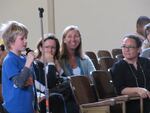[video: opb-election-2016-measure-99-explained,left,580e973bc0e73c003dc2ca50]
Measure 99 on this fall's ballot asks: Is it worth taking $22 million of annual lottery funds, earmarked to build the economy, and spending it so that students can spend time in the woods learning about the environment?
It aims to expand Outdoor School experiences.
Last spring, a teacher at the Camp Tadmor Outdoor School took a group of fifth graders from Harrison Elementary School in Cottage Grove on one of those experiences. She encouraged them to look at what was under a microscope — water from a nearby pond.
“You move the water around. You never know what you’re going to see,” she said.
One student found a small bug in the water, while classmates responded, saying "whoa," "that's cool," and "can I see him?"
Outdoor School has been around more than 50 years and is something of an Oregon institution. Many students attend in fifth or sixth grade and return as counselors in high school.

An eight year-old named "Jake" testified to the Portland School Board in April 2012 in defense of Outdoor School.
Rob Manning / OPB
But Outdoor School supporters say only half of Oregon students are able to participate these days.
Some school districts have had to scale back their spending on Outdoor School in recent years. In 2012, Portland school board members put it on the chopping block as they faced a $27 million budget hole. Former students testified. So did excited younger siblings, like an 8-year-old named Jake.
“I would like it, if I could go to — if I could have the chance to go to Outdoor School," Jake said, nervously, to loud applause from parents and children in the Portland Public Schools board hearing audience.
PPS scaled back its Outdoor School from five days a week to just three. The district's contribution of spending — $150,000 — covered just one-fifth of the cost, with private fundraising, money from other government entities and parent-paid fees making up the rest.
PPS has rebuilt its Outdoor School to a five-day program since then, thanks to $614,000 in district funds for 2015-16, plus $520,000 in funds shared with the Multnomah Education Service District. But the program still relies in part on private fundraising and an $85 fee per participating family.
Funding Outdoor School can rely heavily on local fundraising by parents and communities. That was the case for the Cottage Grove students from Harrison Elementary School.

Allison Lillard, fifth-grade teacher at Harrison Elementary and Outdoor School coordinator for the school.
Scott Greenstone / OPB
“The kids fundraise all year," said Allison Lillard, a Harrison Elementary teacher. "We start with selling candy bars in September. We do a bowl-a-thon in the spring. The parents and the staff put on a huge bingo night and silent auction. The kids, they’re here because they’ve worked hard all year to get here.”
The “Outdoor School For All” coalition went to Salem last year to help communities that struggle to find the money for the program. Legislators approved a grant program in 2015, under the control of Oregon State University’s Extension Service. But it doesn't have money in it. Sen. Arnie Roblan, D-Coos Bay, said the Legislature couldn’t find a funding source.
“I know we didn’t have the money," Roblan said in the waning days of the 2015 session. "We tried a hundred different ways to find it. But at the end, we want the policy, so people understand how to move forward.”
Outdoor School supporters moved forward by putting their financial ask directly to voters at the ballot. Measure 99 would dedicate $44 million of lottery money to Outdoor School in every two-year funding cycle. That's a 4 percent slice of total lottery dollars. Backers say it’s enough money to extend opportunities to every fifth- or sixth-grader in the state.
The “Outdoor School For All” campaign is appealing directly to voters through allies like former Gov. Barbara Roberts, musicians from the Dandy Warhols and stars of the TV series "Portlandia."
But some in the business community — and budget hawks in Salem — are skeptical of the measure.

Sen. Betsy Johnson (D-Scappoose) co-chairs two legislative committees involving transportation and economic development.
April Baer / OPB
Sen. Betsy Johnson, D-Scappoose, appreciated the goal of "sending young people out into the grandeur of Oregon" and she voted in favor of setting up the Outdoor School grant program.
But Johnson does not agree with what Outdoor School supporters have brought to the ballot.
“I have deep concerns about 99," Johnson said. "I’d like the Legislature to have a thoughtful conversation about school enrichment across a number of disciplines, not spend $44 million to send kids to camp!”
Backers argue Outdoor School is more than "camp." Students learn science and team-building skills, and put their regular school work in a fresh context.
But Johnson said Outdoor School’s use of lottery dollars would cut into what the state can spend on economic development — money that Johnson said helped rescue a shellfish company in her district a few years ago.
“We were able to use this money to hire OSU scientists to come down and figure out a solution that was scalable and exportable," Johnson recalled. "We use the money in the lottery for a variety of purposes.”
Johnson does support another measure that draws on lottery money: Measure 96. It’s a constitutional amendment that would invest in veterans’ services. But it’s less than half the cost of the Outdoor School measure.
Measure 99 wouldn't change the Constitution, so Johnson and her colleagues in Salem could tweak it. But Johnson said lawmakers shy away from changing measures that voters approve.

